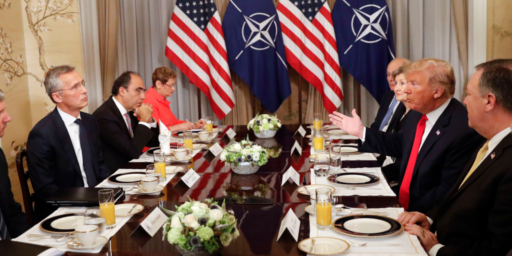IRAQIFICATION
t a c i t u s thinks the new timetable for turning sovereignty over to an Iraqi successor government is dangerous and shameful.
Twice in American history we have failed to see through our responsibilities to a nation defeated in war. The American South was cut loose in 1876 to partially reimpose its own brand of social tyranny; and the Weimar Republic was simply allowed to decay, redefine its responsibilities, and slide into a worse horror than that which preceded it. In both cases, the lesson is plain: victory means hard responsibility, and shirking it bears bitter fruit.
Clearly, the outcomes in both cases were regretable. In the case of the American South, eleven years of Reconstruction was eleven years of unconstitutional suspension of the rights of the people in those states. The abrogration wasn’t in not continuing the military occupation but rather in the spinelessness of the federal judiciary in its unwillingness to enforce the 14th and 15th Amendments. In the case of Weimar Germany, the problem was the foolish reliance on the League of Nations, coupled with a reluctance to engage in peacetime interventionism abroad.
Tacitus thinks the Administration is caving in to the guerillas are driven by reelection politics. Further, he fears that a theocracy by the majority Shi’a is an inevitable result. I’m not sure why paying attention to what the electorate wants is a bad idea, so long as it isn’t the only consideration. And short of breaking Iraq into constituent states, it is unclear how to prevent the dominance of the government by the majority. Presumably, we’ll impose some version of a Bill of Rights and a federalist system into their constitution. Whether that will sustain itself in the long run is anyone’s guess. We can’t impose our will forever; either Iraq is going to be a sovereign state or it will be an American colony.
Dean Esmay thinks Tacitus is overlooking the big picture. He argues that Vietnamization was working splendidly until Congress suddenly defunded it. Because the American public lacks patience in its overseas commitments, the Administration’s options are limited. Therefore, turning things over to an elected government while remaining there for a number of years in a much less visible role is the best that can be hoped for. For Iraq to make the sort of transformation that Germany and Japan did after WWII is unrealistic; a state like Turkey would be a more reasonable goal.
There’s no reason to think the American public will oppose a long-term commitment in Iraq. We’ve maintained troops in Germany and Japan since WWII, in Korea since 1950, and Bosnia since 1995. What the public won’t tolerate is continued American casualties from the insurgency. We’ll likely have troops in Iraq indefinitely, but they need to be there in a background role rather than as an army of occupation. Our continued presence in that role continues to breed resentment and fuel the violence against us. Once we’ve turned day-to-day governance over to an elected Iraqi assembly, it will be much easier to be seen as liberators.





You mean Chalabi? The IGC that, according to our own intelligence and man on the ground Bremer, doesn’t have the trust of the people?
Seems to me that if we turn it over to these jokers, we’re going to have the equivalent of 1984 Iran pretty quick.
Let’s see, how many times have we changed the plan now? And that NATO bit going on now – you know, to internationalize the occupation – that’s rich.
Seems to me the Administration is about 2 steps behind and late to the game every time they switch plans. The plan they are currently trying is the plan they should have been doing 3 months ago – consistently.
They’re way behind the ball. And the reason why is that they seem constitutionally incapable of correctly assessing the enemy. Plans based on a fantasy world, feed by his nibs Chalabi.
Ignoring the basics in Iraq sure is fun, as it permits endless vituperation of the administration. But I think it’s better to have reasonable expectations and pay attention to the local realities.
The Shi’a are a clear majority with the deepest and most bitter determination not to end up on the short end of the stick in Iraq ever again. From the outset they’ve decided on a course of forcing early and frequent demonstration of their majoritarian clout, by insisting on plebiscites or elections for the constitution-writing process. The Sunnis and Kurds joined them once it was clear they couldn’t be moved — Bremer was the last to cave, partially undercut by the Dec. 15 deadline for a timetable.
The Germany/Japan model — firm US control until constitutions and political frameworks were established — was clearly preferrable and our first choice (though most people forget how MacArthur permitted and encouraged Japanese elements to shape the outcome, making it far from a purely imposed product). Iraqi realities — it’s not a shattered, defeated yet unified nation like Germany and Japan were, and is naturally going to be trickier to work with — simply don’t permit a clean, imposed outcome.
But on another matter, this post repeats a grossly mistaken idea — that “resentment” at our occupation fuels the violence. The violence is almost entirely fueled by the opposition of remnants of the regime we toppled — opposition that by definition will not be finessed, and that could care less about the details of political transformation. Ba’athist security goons, former military, and criminals in their pay oppose us because we knocked them out of power and are empowering their blood enemies …. the people of Iraq. Al-Qaeda/Hezbollah/Iranian agents probably responsible for some of the truck bombings oppose us for larger reasons. None of them will be mollified by anything we do or don’t do WRT to handover of sovereignty. There may be on-the-ground benefits to this, but they’ll be on the margins, and not among the hard-core opposition.
That’s why, as Rumsfeld immediately said, the security and political programs are on separate tracks. The Shi’a majority that forced our hand on the approach to political development wants us to stay until the common enemy is vanquished, as it will be. US forces will be present, dying and killing the other side, until it’s done, no matter how quickly, how well, or on what course the political program proceeds.
There may have been mishandling of the situation, though I’m not sure how you’d outmaneuver the Shi’a on this one. The Dec. deadline was just the last straw — strategically they would always get their way if they hung tough — and as noted in the post here, it’s not clear what’s wrong with that. It was sensible to pursue a Germany/Japan model, but unsurprising that it proved infeasible, given local realities.
On the streets, the hopelessly jumbled mix of emotions towards our troops will probably never sort itself out (ridiculous complaints and unreal expectations one minute, gratitude for offing some criminal element the next). At the critical leadership levels, though, we’re neither occupiers nor liberators at this point, but assets — the good news is we are either neutral about or share the objectives of the likely winners (Shi’a, Kurds).